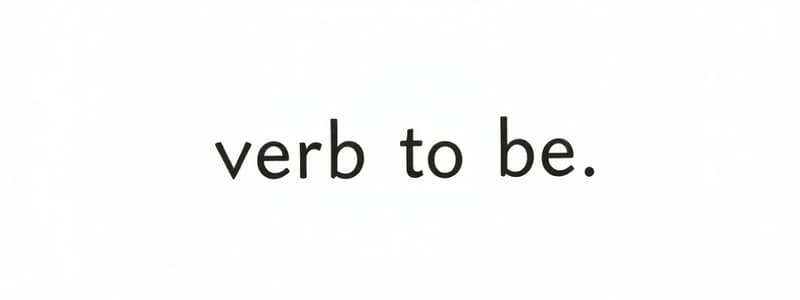Podcast
Questions and Answers
Which sentence correctly uses the passive voice?
Which sentence correctly uses the passive voice?
- The group completed the project.
- The students learn the material.
- The teacher corrects the papers.
- The papers are corrected by the teacher. (correct)
What is the structure of a passive voice sentence?
What is the structure of a passive voice sentence?
- Subject + Main Verb + Object
- Subject + Auxiliary Verb + Object
- Subject + be + Past Participle (correct)
- Subject + Verb + Complement
Identify the passive voice in the following options.
Identify the passive voice in the following options.
- The library has many books.
- The book was read by Maria. (correct)
- Maria reads the book.
- Reading the book is fun.
How would you turn 'The chef prepares the meal' into passive voice?
How would you turn 'The chef prepares the meal' into passive voice?
Which of the following sentences is NOT in the passive voice?
Which of the following sentences is NOT in the passive voice?
In which context is the passive voice typically used?
In which context is the passive voice typically used?
What form of the verb 'have' serves as the auxiliary verb in passive constructions?
What form of the verb 'have' serves as the auxiliary verb in passive constructions?
What is the main purpose of using passive voice in writing?
What is the main purpose of using passive voice in writing?
Which form of the demonstrative pronoun correctly completes the sentence: 'Look at __________ newspaper here.'?
Which form of the demonstrative pronoun correctly completes the sentence: 'Look at __________ newspaper here.'?
Select the correct reflexive pronoun to complete the sentence: 'He cut _____________________ with the knife while he was doing the dishes.'
Select the correct reflexive pronoun to complete the sentence: 'He cut _____________________ with the knife while he was doing the dishes.'
Which option correctly completes the sentence: 'Are those (their/ theirs) trainers?'
Which option correctly completes the sentence: 'Are those (their/ theirs) trainers?'
Complete the sentence correctly: 'I haven't seen _______ for ages. They look great.'
Complete the sentence correctly: 'I haven't seen _______ for ages. They look great.'
Choose the correct pronoun to complete the sentence: 'My mother often talks to _________.'
Choose the correct pronoun to complete the sentence: 'My mother often talks to _________.'
What is the correct reflexive pronoun to fill in the blank: 'We helped _______________ to some Coke at the party.'?
What is the correct reflexive pronoun to fill in the blank: 'We helped _______________ to some Coke at the party.'?
Which demonstrative pronoun appropriately completes: '__________ are my grandparents, and _________ people over there are my friend's grandparents.'?
Which demonstrative pronoun appropriately completes: '__________ are my grandparents, and _________ people over there are my friend's grandparents.'?
Choose the appropriate pronoun to complete the sentence: 'How are _______?'
Choose the appropriate pronoun to complete the sentence: 'How are _______?'
Which of the following is an example of an absolute possessive pronoun?
Which of the following is an example of an absolute possessive pronoun?
What interrogative pronoun would be appropriate in the sentence: '_______ wants to join the team?'
What interrogative pronoun would be appropriate in the sentence: '_______ wants to join the team?'
Which of the following sentences correctly uses an absolute possessive pronoun?
Which of the following sentences correctly uses an absolute possessive pronoun?
Which sentence correctly employs an interrogative pronoun?
Which sentence correctly employs an interrogative pronoun?
Identify the sentence that incorrectly uses a personal pronoun.
Identify the sentence that incorrectly uses a personal pronoun.
In which of the following sentences is 'its' used incorrectly?
In which of the following sentences is 'its' used incorrectly?
Which possessive pronoun fits correctly in the sentence: 'This is _____ book.'?
Which possessive pronoun fits correctly in the sentence: 'This is _____ book.'?
How should the sentence 'Have got computer Mary?' be correctly phrased to use a personal pronoun?
How should the sentence 'Have got computer Mary?' be correctly phrased to use a personal pronoun?
Flashcards are hidden until you start studying
Study Notes
The verb "to be"
- The Verb "to be" is a key verb in English, playing a major part in many grammatical constructions.
- It has many usages and meanings, both as a main verb and as an auxiliary verb.
- It acts differently in negative sentences and questions.
Verb "To Be" in the Present Simple Tense
- Affirmative: I am, We are, You are, They are, He is, She is, It is
- Question: Am I?, Are We?, Are You?, Are They?, Is He?, Is She?, Is It?
- Negative: I am not, We are not (aren't), You are not (aren't), They are not (aren't), He is not (isn't), She is not (isn't), It is not (isn't)
Usages of the Verb "To Be"
- With a noun: "I am a student of the National University of Pharmacy."
- With an adjective: "The students are happy to study at this University."
- As an auxiliary verb with the -ing form: "We are studying English at the moment."
- With the -ed form to make the passive voice: "The texts are read by the students."
- With a prepositional phrase: "Ivan and his wife are from Kharkiv."
The verb "have" as a main verb
- It can be used in Affirmative, Negative and Interrogative forms.
- The absolute possessive pronouns are mine, yours, his, hers, ours, and theirs.
- Absolute forms replace the antecedent and indicate belonging.
Interrogative Pronouns
- These pronouns are used in questions.
- They include who, what, which, and whose.
Pronouns
- Personal pronouns: I, me, you, he, him, she, her, it, we, us, they and them
- Possessive determiners: my, your, his, her, its, our, their
- Reflexive pronouns: myself, yourself, himself, herself, itself, ourselves, yourselves, themselves
- Demonstrative pronouns: this, that, these, those
Studying That Suits You
Use AI to generate personalized quizzes and flashcards to suit your learning preferences.




